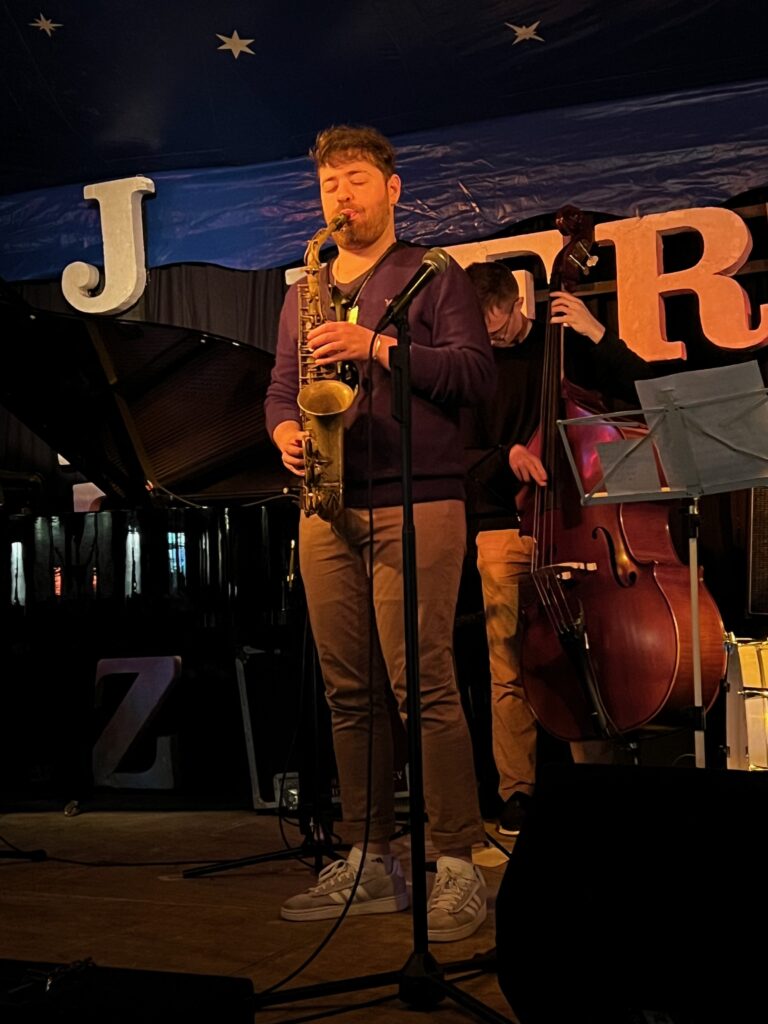When Aviv, our saxophone-playing musician son, was invited to perform at a jazz festival in Switzerland, my wife, Jody, and I decided to use that as an “excuse” to plan a vacation in Europe.
I loaded up on every med I might possibly need – stomach pills, sleeping pills, allergy pills, antibiotics (just in case).
Everything was in place. Online check-in for our flights, check. Rental car reservation. Check.
Then, 24 hours before we were set to fly, I broke my toe.
It was a careless mistake – I was coming out of the shower and slammed my foot into a wall.
I sunk into depression.
We were hoping to finally do some hiking; a year of cancer-related foot and leg pain that had kept me off the trails was finally calming down. Now, in light of my toe, I wondered: Did we need to cancel the trip entirely?
Spoiler alert: We went on the trip and had a fabulous time. But not before I was forced to confront my biggest bugaboo: an intense discomfiture when confronted with uncertainty.
When something is not certain, it creates anxiety. My uncertainties were myriad.
- Was it prudent to grin and bear it and still go on the trip? Uncertain.
- What if I got sick while on the road? We could wear our Covid masks everywhere, but ultimately, we have no real control.
- Will our luggage arrive? Waiting at an airport conveyor belt always ratchets up my heart rate, despite a pretty good if not perfect track record.
- The weather was predicting rain the entire trip. Would that be all-day-all-the-time, or rather confined to a few brief afternoon downpours?
- What happens if Iran or Hezbollah launches a major attack while we’re out of the country? Will we be stuck overseas?
The matzav – the “situation” around the war in Gaza, Israel’s growing isolation and the government’s endemic botching of both hostage negotiations and putting forward a “day after” plan – has only exacerbated my aversion to uncertainty. When our trust in the government has been so profoundly eroded, how can we trust that “everything will work out” in our personal lives?
Our trip to Europe provided some surprising insights.
We had arrived at Gissebach Falls, an energetic waterfall flowing into Lake Thun, not far from the town of Interlaken. We hiked up to the main viewing point, but the trail continued. Should we keep going? What would be around the next bend? How far were we willing to climb?
It was all uncertain. And I loved it.
There are two types of uncertainty, I realized.
“Anxious uncertainty” is what usually fells me. Sending your kids to the army and not knowing where they are or what they’re doing is perhaps the quintessential Israeli example.
“Expectational uncertainty” comes into play when you are looking forward to something – a hike, a nice meal, a new grandchild – and you embrace the uncertainty as part of the joy.
Is there a way to transform anxious uncertainty into expectational uncertainty? To treat what usually makes me anxious with a sense of curiosity?
“Not really,” my therapist responded, pouring water on the fire of my optimism. “You can’t easily turn worry about whether your luggage will be next off the conveyor belt into curiosity. It’s just annoying.”
Moreover, if you hold onto your expectations too tightly, they can turn into anxious regret if what you were anticipating is dashed.
My therapist has long been a fan of the Serenity Prayer.
“Grant me the serenity to accept the things I cannot change, the courage to change the things I can, and the wisdom to know the difference.”
That never spoke to me so much. But then she added another line, which did:
“And whatever happens, I will find a way to handle it.”
We listed a few of the challenges life had thrown my way.
- Cataract surgery? It wasn’t pleasant and resulted in unexpected floaters, but I handled it.
- Cancer? I toughed out the treatment and am well on my way to recovery.
- An impossible deadline? I know how to hunker down, working through the night if necessary.
- Vehicle got a flat? There was enough air left to hobble the car over to the nearest mechanic who patched the tire; I was soon back on my way.
- The hiking path leading down from the top of the Stockhorn, with its phenomenal views of the Swiss Alps, was closed due to a snowstorm the week before? We went to a different mountain and drank in an equally lovely panorama.
The American Psychological Association lists a number of tips for dealing with the stress of the unexpected. Here are five that spoke to me.
- Be kind to yourself. Some people are better at dealing with uncertainties than others. Don’t beat yourself up if your tolerance for unpredictability is lower than a friend’s.
- Limit exposure to news. When we’re stressed about something, it can be hard to look away. But compulsively checking the news (or weather forecast) only keeps one wound up.
- Take your own advice. Ask yourself: If a friend came to me with this worry, what would I tell that person?
- Avoid dwelling on things you can’t control. Get out of the habit of ruminating on negative events.
- Focus, instead, on things that are within your control. That could be as simple as laying out your clothes the night before a stressful day.
Jody and I have been practicing “I can handle it” and, while I’m still getting used to this new way of thinking, I’m certain that it will yield results.
Oh, and that broken toe – it healed so quickly it probably was just bruised. It barely interfered with our enjoyment of the trip.
I first wrote about Expectational Uncertainty in The Jerusalem Post.
Pictures: credit Brian Blum



